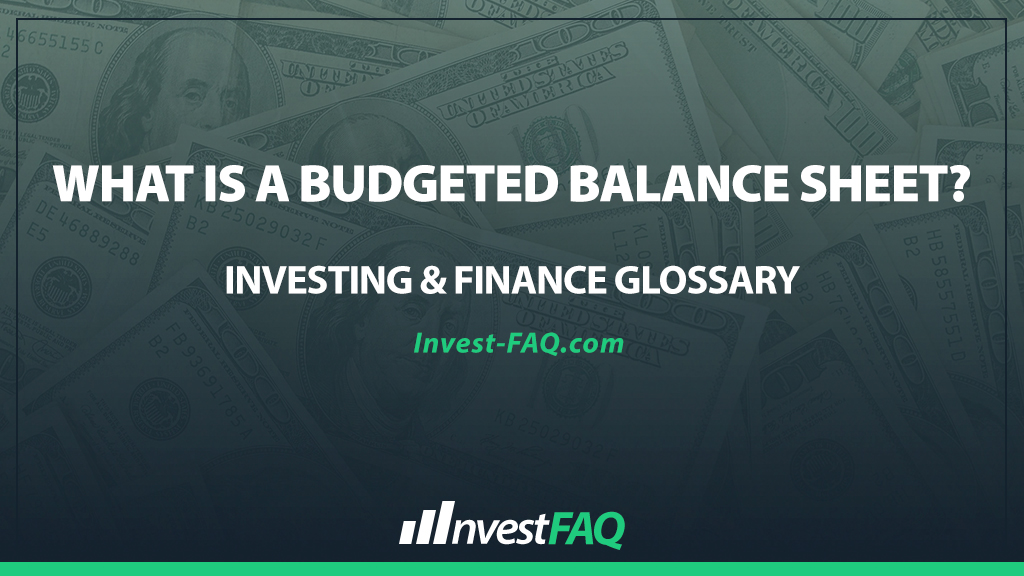
Budgeted Balance Sheet
Contents
A budgeted balance sheet is a financial statement that projects a company’s financial position at a future date, based on its budgeted activities and assumptions for a specific period. It outlines expected assets, liabilities, and equity, reflecting the financial impact of the company’s budgeted operations, investments, and financing activities.
In business, a budgeted balance sheet is an essential tool for financial planning and analysis.
It provides insights into the expected financial health of a company, helping management to anticipate changes in assets, liabilities, and equity resulting from planned operations.
This forward-looking perspective enables businesses to make strategic decisions, such as securing financing, planning for capital expenditures, or evaluating the feasibility of new projects, with an understanding of their potential impact on the company’s balance sheet.
Example of a Budgeted Balance Sheet
Imagine “Tech Innovate Inc.,” a technology firm, is preparing its budget for the upcoming year, including a budgeted balance sheet. Based on its budget, the company anticipates:
Ending cash balance of $150,000 after accounting for projected operational cash inflows and outflows.
Accounts receivable of $200,000, reflecting expected credit sales.
Total liabilities of $300,000, including accounts payable and a short-term loan.
Retained earnings of $100,000, after budgeting for net income and planned dividend payments.
The budgeted balance sheet for the end of the year would therefore display:
Assets: Including cash of $150,000 and accounts receivable of $200,000.
Liabilities: Totaling $300,000.
Equity: Reflecting retained earnings of $100,000.
In this scenario, “Tech Innovate Inc.” uses its budgeted balance sheet to forecast its financial standing at the year’s end, assuming all planned activities proceed as expected.
This financial projection helps the company’s management understand the anticipated changes in its financial position, facilitating strategic planning around resource allocation, investment opportunities, and financing needs.
By comparing these projections with historical and current balance sheets, management can also assess the expected growth or contraction in net assets and evaluate the company’s financial strategy.
Significance for Investing & Finance
The budgeted balance sheet holds significant importance in accounting and financial management for several reasons:
Strategic Planning: It aids in long-term financial planning, allowing businesses to align their operational, investing, and financing activities with strategic goals.
Financial Health Forecasting: By projecting future financial positions, companies can anticipate potential issues, such as liquidity constraints or over-leveraging, and plan corrective actions.
Performance Measurement: Comparing actual balance sheets with budgeted ones helps in assessing the accuracy of financial forecasting and the effectiveness of budget management practices.
Stakeholder Communication: A budgeted balance sheet can be used to communicate with investors, lenders, and other stakeholders about the company’s future financial expectations, supporting funding and investment discussions.
In summary, a budgeted balance sheet is a crucial component of financial planning, offering businesses a snapshot of their anticipated financial position based on planned activities.
It plays a vital role in strategic decision-making, financial health monitoring, and performance evaluation, enhancing the overall financial management process.
FAQ
How does a budgeted balance sheet differ from a standard balance sheet?
A budgeted balance sheet presents projected financial positions for a future date based on planned activities and assumptions, whereas a standard balance sheet shows the actual financial position of a company at a specific past or current date.
What role does a budgeted balance sheet play in securing financing for a business?
A budgeted balance sheet can demonstrate to potential lenders or investors the company’s expected financial health and stability in the future, supporting the case for loan approval or investment by showcasing the company’s ability to meet financial obligations.
Can the accuracy of a budgeted balance sheet affect a company’s strategic decisions?
Yes, the accuracy of a budgeted balance sheet is critical for making informed strategic decisions, as inaccuracies can lead to misguided resource allocation, investment, and financing choices, potentially harming the company’s financial health.
How often should a company update its budgeted balance sheet?
A company should update its budgeted balance sheet regularly, at least annually or as significant changes occur in its business operations, market conditions, or financial strategies, to ensure it reflects the most current expectations and plans.
